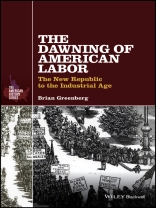A concise history of labor and work in America from the birth of the Republic to the Industrial Age and beyond
From the days of Thomas Jefferson, Americans believed that they could sustain a capitalist industrial economy without the class conflict or negative socioeconomic consequences experienced in Europe. This dream came crashing down in 1877 when the Great Strike, one of the most militant labor disputes in US history, convulsed the nation’s railroads. In The Dawning of American Labor a leading scholar of American labor history draws upon first-hand accounts and the latest scholarship to offer a fascinating look at how Americans perceived and adapted to the shift from a largely agrarian economy to one dominated by manufacturing.
For the generations following the Great Strike, ‘the Labor Problem’ and the idea of class relations became a critical issue facing the nation. As Professor Greenberg makes clear in this lively, highly accessible historical exploration, the 1877 strike forever cast a shadow across one of the most deeply rooted articles of national faith–the belief in American exceptionalism. What conditions produced the faith in a classless society? What went wrong? These questions lie at the heart of The Dawning of American Labor.
* Provides a concise, comprehensive, and completely up-to-date synthesis of the latest scholarship on the early development of industrialization in the United States
* Considers how working people reacted, both in the workplace and in their communities, as the nation’s economy made its shift from an agrarian to an industrial base
* Includes a formal Bibliographical Essay–a handy tool for student research
* Works as a stand-alone text or an ideal supplement to core curricula in US History, US Labor, and 19th-Century America
Accessible introductory text for students in American history classes and beyond, The Dawning of American Labor is an excellent introduction to the history of labor in the United States for students and general readers of history alike.
विषयसूची
List of Illustrations
Acknowledgments
Prologue: American Exceptionalism and the Great Strike of 1877
Chapter 1: Artisans in the New Republic, 1787-1825
The Artisan Workplace
The Political Economy of Early America
The Early Transformation of the Workplace
Rural Manufactures
The Economy of Seaport Cities
Manual Labor In and Out of the City
Economic Change and the Demise of the Artisan Order
Celebrating the New Era
Chapter 2: Labor in the Age of Jackson, 1825-1843
The Geography of Industrialization
Cultural Response to Industrialization
Holding Onto the Familiar
Religion, the Revivalists, and the New Work Ethic
Radical Resistance to the New Industrial Order
Chapter 3: The Industrial Worker in Free Labor America
Lynn as a Microcosm
Not Just Lynn
Labor Reform and the Remaking of American Society
Immigrant Workers Confront Nativism
Black Workers in a White World
Trade Unions on the Move in the 1850s
Chapter 4: From the Civil War to the Panic of 1873
Labor and the War
The ‘Great Lockout’ of 1866
‘Eight Hours for Labor, Eight for Recreation, and Eight for Rest’
Building a National Organization
Epilogue: A Tradition of Labor Protest Persists
Bibliographical Essay
Index
लेखक के बारे में
Brian Greenberg, Ph D Emeritus Professor Emeritus Jules Plangere Chair in American Social History.












